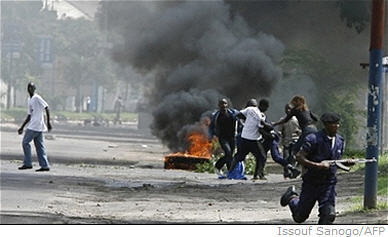 417 people, including women, children and street children, who were arrested by the Congolese National Police (PNC) after the November 11 2006 unrest in Kinshasa, have been detained and will now be sent on national service against their will.
417 people, including women, children and street children, who were arrested by the Congolese National Police (PNC) after the November 11 2006 unrest in Kinshasa, have been detained and will now be sent on national service against their will.
These arrests follow the fighting in the Congolese capital on the morning of Saturday November 11 last when 4 people were killed, including three civilians and an FARDC soldier.
The Governor of the city and province of Kinshasa launched an official press release saying that the arrests are the result of the decision to prevent any unauthorised protest or demonstration in Kinshasa.
In the press release, the Governor announced a reinforcement of police patrols in Kinshasa, and clarified that 39 women and 87 minors, including 3 babies, are among those arrested.
According to the Governor, “these persons who have become habitual offenders are placed at the disposal of the National Service, following the directive of the Minister of the Interior, Security and Decentralisation.”
“They will be trained and introduced to works in the production sector, particularly farming and agriculture, at the expense of the city and province of Kinshasa. They will get vocational training which will help them to become useful for themselves and the nation.”
The press release also states that the male street children will be transferred to a pilot center for national service in Kanyama Kasese in the province of Katanga, while the women will be transferred to a center in Menkao, on the Bateke plateau in Kinshasa.
This intervention of the PNC, which continued until Monday November 13, and which is welcomed in some ways, also raises serious questions.
Not all the arrested people were implicated in the confrontations of November 11 in Kinshasa. Consequently, if no charges are made against them, they must be released.
The current performance of the PNC, due to the support of MONUC and EUPOL, has enabled them to reach an acceptable standard in relation to respect for human rights.
As they await prosecution, the people arrested in obvious law and order offences and those against which charges were already made are likely to be kept in Makala prison.
On the other hand it is difficult to understand why this same police force, on the order of the Admiral Liwanga Mata Nyamunyobo, Governor of the city-province of Kinshasa, decides to send some of those arrested to centres of paramilitary and civic formation which have not been operational for a long time.
However, even if the arrests of people implicated or non implicated in the unrest forms part of the prerogatives of the police force, no legislation makes it possible for the security services to transfer, against their will, the people who have not yet been prosecuted to centres of formation where the living conditions leave something to be desired.
While waiting to see whether the Kinshasa police authorities will go through with this plan, one must also question the conditions of detention in the Provincial Inspection of Kinshasa (IPKin), when one knows the living conditions in the Kinshasa prisons.
Related articles
- • Tshisekedi Announces Government of National Unity and Calls for Unity Against M23 Rebels (February 23, 2025)
- • UN Security Council Calls on Rwanda to Stop Supporting M23 Rebels in DR Congo (February 22, 2025)
- • DR Congo Citizens Head to Polls to Elect President, Members of Parliament (December 20, 2023)
- • Moise Katumbi blocked from entering DR Congo (August 3, 2018)
- • Jean-Pierre Bemba Returns to DR Congo (August 1, 2018)
- • At least 30 dead after massacres in Ituri (March 2, 2018)
- • Botswana Urges Joseph Kabila to Step Down (February 26, 2018)
- • No elections in DR Congo in December without electronic voting machines: INEC (February 13, 2018)
- • DR Congo reach final of African Nations Championship (February 3, 2016)
- • Political tensions 'running high' in DR Congo ahead of 2016 elections (October 7, 2015)
- • DRC Army Putting Pressure on FDLR (April 1, 2015)
- • Police Open Fire on Crowd Protesting Election Law Change (January 19, 2015)
- • 15 dead in football match stampede in Kinshasa (May 12, 2014)
- • At least 60 killed as train derails in Katanga province (April 23, 2014)
- • Security Council extends UN mission, intervention force in DR Congo for one year (March 28, 2014)
- • Death toll in Lake Albert boat accident rises to 108 people (March 24, 2014)
- • New DR Congo amnesty law welcomed by UN envoys (February 5, 2014)
- • Colonel Mamadou Ndala Is Killed in Ambush (January 2, 2014)
- • No 'Peace Deal' With Defeated M23 Rebels, DR Congo Says (November 11, 2013)
- • Congo Will Not Sign a 'Peace Deal' With Defeated M23 Rebels, Government Says (November 6, 2013)
- • Congo Army Takes Control of Mbuzi Hill From M23 Rebels (November 4, 2013)
- • Kabila Congratulates Congo Army for Defeating M23 Rebels (October 30, 2013)
- • Advancing Congo Troops Take Control of Rumangabo From M23 Rebels (October 28, 2013)
- • Congo Army Liberates Rutshuru, Kiwanja and Kibumba From M23 Rebels (October 27, 2013)
- • Congo Army Dislodges M23 Rebels From Strategic Town of Kibumba (October 26, 2013)
- • Ban Ki-moon Confirms M23 Rebels Shelled Rwanda (August 31, 2013)
- • DR Congo Will Defend Itself Against an Attack by Rwanda, Government Says (August 31, 2013)
- • M23 Rebels Fired Shells Into Rwanda, Not Congo Army, UN Says (August 30, 2013)
- • Mortar Shells From Rwanda Kill Civilians in Eastern Congo (August 23, 2013)
- • Dozens of M23 Rebels Killed by Congo Army in Renewed Fighting (August 22, 2013)
Tags: |







